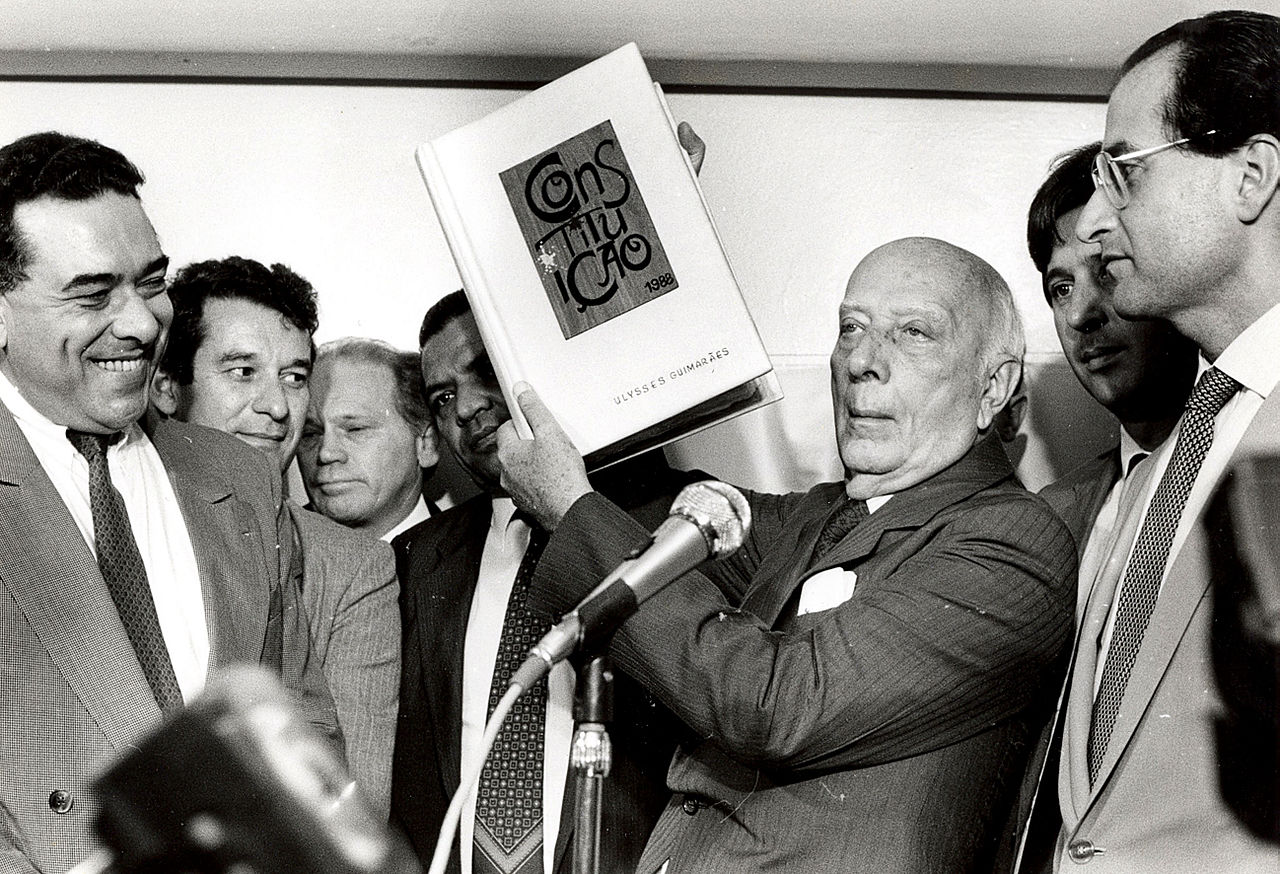
Ulysses Guimaraes and the Brazilian Constitution of 1988. Agência Brasil, Wikimedia Commons (CC BY 3.0.)
This symposium brings together five scholars to discuss Amy Kapczynski’s important essay “The Right to Medicines in an Age of Neoliberalism” originally published in the Spring 2019 issue of Humanity. It also includes a response to commentary by Kapczynski. The essay analyzes “right to medicines” cases, arguing that human rights, even in “socioeconomic” form, can intensify inequality and reproduce neoliberal logics, where they are simply overlain upon the existing political economy.
Content
This post is part of a symposium on Amy Kapczynski’s essay “The Right to Medicines in an Age of Neoliberalism.” All contributions to the symposium can be found here. Across the Americas, peoples (let’s keep them multiple) live in exhausted worlds. Worlds on the edge of autocracy, of financial collapse, of infrastructural breakdown and environmental tipping points—mediated by extreme populism and state and corporate efforts to dismantle piecemeal, though meaningful, agendas of socioeconomic rights. Violence and deadly health disparities are persistent realities that, time and
Read More »
This post is part of a symposium on Amy Kapczynski’s essay “The Right to Medicines in an Age of Neoliberalism.” All contributions to the symposium can be found here. Amy Kapczynski’s essay, “The Right to Medicines in an Age of Neoliberalism,” is a persuasive and provocative retort to recent claims by Naomi Klein and others that human rights discourse is an impotent weapon against neoliberalism, if not a complement to it. Through the specific example of the human right to medicines guaranteed by law in
Read More »
This post is part of a symposium on Amy Kapczynski’s essay “The Right to Medicines in an Age of Neoliberalism.” All contributions to the symposium can be found here. Introduction Amy Kapczynski’s article presciently points out the weaknesses of the judicialization of the right to medicines, and its failure “to engage a foundational aspect of [these cases]: the political economy of medicines that they assume.”[1] Kapczynski argues that these cases suggest that a right to medicines “imbricated” within the prevailing neoliberal regime is plausibly regressive:
Read More »
This post is part of a symposium on Amy Kapczynski’s essay “The Right to Medicines in an Age of Neoliberalism.” All contributions to the symposium can be found here. Amy Kapczynski’s essay “The Right to Medicines in an Age of Neoliberalism” is part of a growing scholarship on the apparently paradoxical situation where human rights are mainstreamed globally as the lingua franca to discuss issues of justice while inequalities increase and the capacity of states to provide social protection and promote redistribution is reduced. Some
Read More »
This post is part of a symposium on Amy Kapczynski’s essay “The Right to Medicines in an Age of Neoliberalism.” All contributions to the symposium can be found here. It is refreshing to read a critique of human rights that is neither overly deterministic nor overly grounded in the experience and concerns of the Northwest quadrant of the globe. Amy Kapczynksi’s call for an approach to human rights that attacks the political economy of a problem is an excellent contribution to the current debate about
Read More »
This post is part of a symposium on Amy Kapczynski’s essay “The Right to Medicines in an Age of Neoliberalism.” All contributions to the symposium can be found here. The most elemental claim I make in “The Right to Medicines in an Age of Neoliberalism” is that questions of political economy should be central to the analysis and practice of contemporary human rights. I read this superb set of responses as essentially in agreement, and I will focus here on how they speak to a
Read More »

